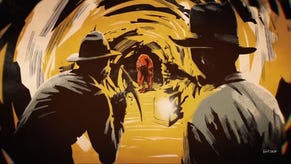Former Dishonored creative director suggests all genres could be immersive sims
Is Minesweeper an immersive sim?
Some former Prey and Dishonored developers are making Weird West, a top-down cowboy action-RPG that's a bit like an immersive sim. This much we knew, and had already puzzled over. Fondly, like. The dev's pedigree gained my curiosity, but this interview with Prey and Dishonored creative director Raphael Colantonio has my attention.
Weird West will be an "action-resolved version of something like Fallout meets Ultima 7", says Colantonio, with "a space of possibilities where no two players have the same playthrough exactly". He doesn't let slip much more than that - but he does have some interesting things to say about immersive sim-iness, and why he left Arkane.
All this comes from cheery RPS fanzine PC Gamer, but here's what Wild West looks like before we get into sim chat.
"Immersive sim", like all terms, gets weirder the longer you think about it. Nowadays it normally brings to mind first-person games like Deus Ex, where you're encouraged to approach situations from different angles. If a game lets you choose between shooting your way into a building, talking your way past the guards, or clambering through vents, then it's probably an immersive sim. It's a broader idea than that though, with RPGs like Ultima 7 also embracing the idea that you're living in a natural world that reacts to your behaviour. It's a fairly nebulous idea, which is why I like what Colantonio points to here:
"If there's something that you see, it has a weight, it has physics properties ... It maps to some expectations of players of a system that is going to say 'yes' to them all the time," he said. "We don't fake things."
That's neat. Immersive sims are games that say yes to you, and you can track that principle down into elements like physics objects. All games say yes to you to some extent, though, which is what Colantonio gets into here:
"I think a lot of people are fine with — happy, actually, maybe they feel safer — playing in games that are more channeled, that are more in a canyon, a very controlled experience, very prescribed," he said. "And then there's a cinematic that tells them a bit of story and they feel good about it, and then it keeps going and they kill a few more monsters, and then it stops again with another cinematic. I don't get that, it's not my thing. But technically, what we call immersive sims could be applied to anything, really."
Genre discussions are often dry, but there are some spicy meatballs there. I don't think any game with physics automatically qualifies as an immersive sim, but they're certainly a component of... naturalistic freedom. Plus that's not something I'd associate with Minesweeper, if all genres can be immersive sims. Perhaps the best way of approaching it is to figure out what avenues of freedom and simulation we consider important enough for a game to enter immersive sim territory. Or perhaps we should move on before I start talking about Wittgenstein's family resemblance theory of definitions again.
Other parts of the chat feed more directly into what Wild West's aspiring to be - an immersive sim that doesn't overwhelm you, basically:
"I look at it the same way as back when I was at Arkane, I did games like Dishonored for example, and it was the same question," he said. "Is it too complicated? Are people going to be turned off by all the stealth and the indirect ways you can do things? I think as long as you bring up the accessibility, as long as you bring that depth to the surface, and it doesn't look complex—the problem is complexity—but if it's accessible yet deep, then I think it's a win.
"Even me, I don't like complex games. I'm an old-school gamer, but I like games that are simple to play, and then the depth emerges later, little by little. That's the beauty of these games, and a good immersive sim should be made like that, I think."
Elsewhere, Colantonio mentions how he feels more free to take risks now that he's working with a smaller team, and talks about how an ideal version of the games industry would let people dip in and out for passion projects rather than grinding them down. The full interview is well worth checking out.









